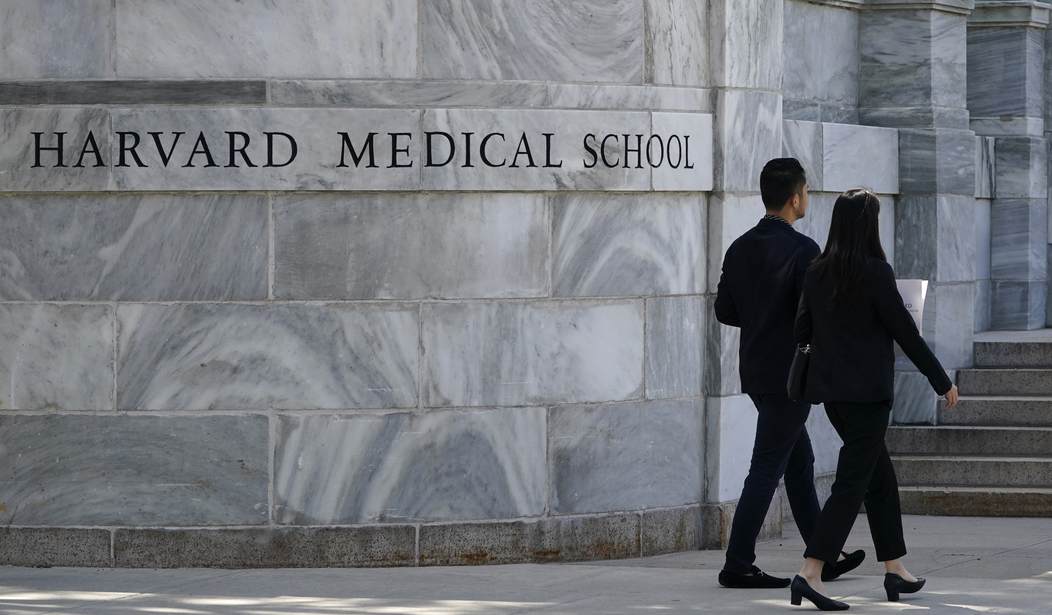Healthcare watchdog group Do No Harm has released a report exposing left-wing activism's takeover of medical academia, specifically how "medical schools are short-changing rigorous training in science for the political indoctrination of future doctors."
The 14-page report, titled "Activism Instead of Anatomy: The Sorry State of Medical School Curricula," systematically examined the course catalogs of 20 top-rated medical schools across the country to identify instances of radical political objectives embedded in the teachings as opposed to typical medical knowledge.
We conducted a study on left-wing activism in medical schools. The findings were shocking.
— Do No Harm (@donoharm) September 23, 2024
Check out some of the results of this report from @jaypgreene below 👇👇
Download the full report: https://t.co/CLeDDxQfEU pic.twitter.com/uFEh4ytoGs
This research was conducted by searching for keywords that are emblematic of the DEI agenda, such as "diversity," "racism," and "identity," and comparing them to the appearances of traditional terminology used in medical education like "physiology," "anatomy," and "Hippocratic."
Do No Harm found that the frequency of the DEI jargon far exceeded the usage of scholarly, scientific terms, signifying that medical school courses focus more on ideological issues than they do on foundational ones.
"Diversity" appeared more frequently than "chemistry." Obesity, one of the country's most serious health challenges, was mentioned less often than every one of the DEI buzzwords, including "justice." The word "equity" cropped up more than three times as often as "obesity."
Recommended
Basic medical research terms hardly appeared in the course catalogs at all. Such sociopolitical phrases, like "inclusive/inclusion," appeared almost 10 times as often as the research term "randomized" and almost 18 times as often as "placebo.”
I searched medical school course catalogs for 16 key terms -- 8 emblematic of a DEI political agenda and 8 representing more traditional scientific concerns. Politicized issues are eclipsing scientific ones. Social appears more often than physiology, anatomy, or chemistry. 2/ pic.twitter.com/L0oQWvlzkF
— Jay P. Greene (@jaypgreene) September 16, 2024
"Medical school coursework appears to be much more concerned with conveying ideological goals to future doctors than with teaching them how to interpret, let alone conduct, scientific research," Do No Harm concluded.
Among the highest-ranked institutions Do No Harm studied, seven had more politicized than scientific terms printed in their course catalogs: Harvard, UPenn, Stanford, Vanderbilt, Icahn School of Medicine, Baylor, and Emory.
Do No Harm discovered that this divisive ideology is infused into introductory classes covering basic topics. For example, at the Icahn School of Medicine at Mount Sinai, "Introduction to Anesthesiology" is described as "a core component of the Human Rights and Social Justice Scholars (HRSJ) program for first-year medical students" and "is intended to provide students with a space for building critical thinking and community around social justice work."
"Let's also hope they learn how to administer anesthesia," quipped the author of the report, Jay Greene, a senior research fellow in The Heritage Foundation's Center for Education Policy.
At Harvard Medical School, a course on Integrated Human Pathophysiology "focuses on key concepts in normal physiology and pathophysiology of the kidney, endocrine and reproductive endocrine systems." However, content that "explores health equity" and "climate change" is also "integrated."
Meanwhile, Stanford offers a course called "Global Leaders and Innovators in Human and Planetary Health: Sustainable Societies Lab" that centers on "environmental sustainability" as well as "social and environmental justice and equality."
The Baylor College of Medicine's class on "Human Rights and Medicine" covers "immigration reform," "gender issues," "cross-cultural considerations," and "issues of distributive justice affected by militarization in society."
"The findings confirm that social and political issues have begun to meaningfully crowd out traditional medical training in American medical schools," Do No Harm's study summary says. "This is not an isolated development in a handful of atypical medical schools, but a broad change that is affecting the future of medical practice across the country."
"Lives are on the line," the summary stresses. "This is why documenting the extent to which medical education has become politicized is critically important."
Do No Harm is an advocacy organization representing physicians, nurses, medical students, patients, and policymakers nationwide who want to keep identity politics out of medical education, research, and clinical practice.

























Join the conversation as a VIP Member